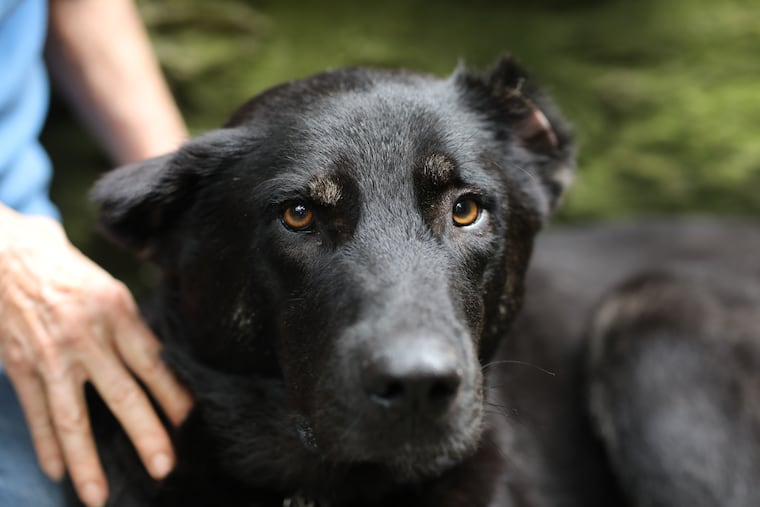Shot in Iraq, Apollo the war-zone dog may find pain relief thanks to 3D printing
Apollo was found in an Iraqi suburb in July 2017, suffering from a gunshot wound to the left front leg.

When strangers first meet Apollo, a mostly black mutt from Iraq, he wraps his left front leg around theirs, and stares up with sad amber eyes.
It feels like a hug or a handshake, but the people who've cared for him in recent months say it may also be a plea because he's in so much pain. Someone shot that leg with a 9mm round in Ankawa, a suburb of Erbil, in July 2017, and left him there to suffer with broken bones and bullet fragments lodged in his muscle.
"Just as sweet as can be," said Valerie Ogden, Apollo's current caretaker, at her home in Chestnut Hill.
As 3D-printed guns have been making headlines recently, a team of veterinarians in Philadelphia plan to use the same technology to print out an entire replica of Apollo's mangled leg and elbow, study and practice surgery techniques on it, and then get to the real thing and alleviate his pain. The surgery would cost $5,000, but all the veterinarians are volunteering.
"When he was shot, for whatever reason, it was left alone," said Ron Ben-Amotz of the Veterinary Specialty and Emergency Center (VSEC). "It is a chronic injury and the bone did not heal the right way. It's somewhat functional, but painful."
According to Stephanie Scott, of SPCA International, Apollo was discovered in Ankawa by PAWS Kurdistan, another nonprofit. Scott said Apollo's cropped ears suggest he was raised to be a guard dog, "but his kind demeanor means he wasn't successful in that role."
"When Apollo was rescued in Iraq in 2017, the first vet who saw him thought he would never use his injured leg again," Scott said in an email.
In April 2018, Apollo was flown from Beirut to Philadelphia and eventually to Ohio as part of Operation Baghdad Pups: Worldwide, a program that brings dogs and cats from overseas into the homes of U.S. service members.
Since 2008, according to the SPCAI website, the program has rescued 640 dogs and cats, including 80 so far this year. It expects to reach 140 animals by the end of 2018.
"He is from a war zone," said Meredith Ayan, the SPCAI's executive director. "It's a terrible, terrible injury for a dog."
Ben-Amotz said Apollo's surgery, which he hopes to complete in the coming weeks, is unprecedented. First, several CAT scans were done, and they helped create a 3D image of Apollo's elbow. That image will soon be sent to a 3D printer that Ben-Amotz and his team can study as they prepare for the actual procedure. Then, 3D cutting guides will be developed to be used in the operation, something that's never been done for elbow surgery in veterinary medicine, he said.
"The idea is to fuse the elbow together so he doesn't need to move it. If he doesn't move it, he won't be in pain," he said.
Apollo's original placement in Ohio didn't work out because of other pets in the household and he wound up in Chestnut Hill with Ogden, who is active in the animal-welfare community. At Ogden's bucolic spread in the woods, Apollo bounds around in the grass with a severe limp.
"He'll run down into the woods and he looks like a deer," Ogden said. "He's gone through so much pain but he seems really upbeat. He loves being outside."
Apollo doesn't like cars, Ogden said, for practical purposes.
"He thinks someone's going to take him away," she said.
Ogden believed Apollo only understood commands in Kurdish, but his love of dog biscuits appeared to transcend language. The goal, she said, is to get Apollo into a "forever home" after his surgery.
"That might be Val, or her son," said Ogden's friend, Beth Ann White, an SPCAI volunteer.
Ogden, who owns two other dogs, said Apollo, at 75 pounds, is just too big for her to care for. She believes he is a German shepherd, though Scott said he's a "total mutt," like many dogs that live in and around war zones.
"He needs a home with children and maybe one other dog," she said. "He's a sweet, sweet boy."
At Ogden's house, Apollo disappeared into the woods and lay under a tree by her pool while the birds chirped all around him. She and White looked up some Kurdish words and spoke them to get him to come back, but he stayed put, looking content.
No one could really get mad at him, considering where he came from.
"I'm from Israel, I can understand how things go over there, " Ben-Amotz said. "It's a complicated area. He may have gotten caught in the cross fire. Somebody could have deliberately shot him."
The veterinary team that will perform surgery on Apollo includes volunteers flying in from Europe. Anyone who wishes to donate to the SPCAI can visit www.spcai.org/donate.